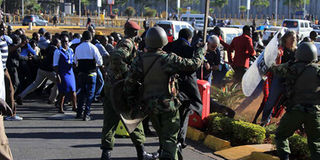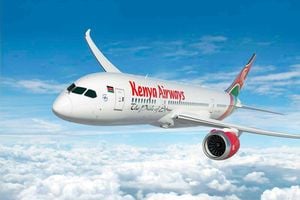Aviation workers’ strike paralyses business at JKIA

GSU officers disperse striking aviation workers at JKIA on March 6, 2019. The strike inconvenienced customers. PHOTO | JEFF ANGOTE | NATION MEDIA GROUP
What you need to know:
- The government deployed Kenya Air Force personnel to the airport in an attempt to manage the damage.
- The KAA has more than 2,000 workers across airports and airstrips in Kenya. A majority, 1,200, are based at JKIA.
Confusion turned into frustration, anxiety and exhaustion for thousands of passengers and workers who were stranded at the Jomo Kenyatta International Airport in Nairobi yesterday after a workers’ strike ground the region’s biggest aviation hub to a halt, resulting in losses that ran into hundreds of millions of shillings, according to industry estimates.
The Kenya Airports Authority (KAA) workers downed their tools at 3am yesterday. This marked the beginning of what would turn into a long, messy and painful day for travellers.
The workers are resisting a proposed takeover of JKIA by the national carrier, Kenya Airways.
From children to sick people and the elderly, hundreds of both domestic and international travellers, who had reported to the airport as early as 5am, spent the day sitting or sprawled in the corridors, or baking in the sun as the airport’s lounges were shut following the strike.
Others were stretchered off to ambulances after they collapsed at the airport following hours of waiting.
LOSSES
Passengers whose flights had been scheduled to take off later in the day were warned not to go to the airport, their anxiety heightened for the better part of the morning by lack of word from the authorities on what was going on.
Various operations at the airport, including aircraft maintenance, cabin crew services, air traffic control, security, fire and rescue, and ground flight services were paralysed. With the critical services suspended, no flight could take off or land at the airport.
Kenya Airways put the loss accruing from the day-long suspension of services to about Sh300 million.
Key installations at east and central Africa’s busiest airport were loosely manned as security guards joined the strike.
DEJECTED CUSTOMERS
At the main entrance of JKIA, which is the first checkpoint, guards ushered in visitors without subjecting them to the usual rigorous security screening.
Flights to Amsterdam, Mumbai and London scheduled to take off in the morning were delayed by more than six hours, taking off early in the afternoon.
Earlier, Kenya Airways had announced that these three flights would not be affected.
After various attempts to end the strike, and as tempers started to flare at the airport, Kenya Airways executives eventually came out to face the aggrieved passengers and tell them what they had been dreading to hear: that they would not be leaving Nairobi. At least not just yet.
The chaos was hard to miss, the pain and loss and inconvenience hard to imagine. By 11am, more than 30 flights had been affected, with most of those to west and central Africa cancelled. Incoming flights were redirected to other airports.
ILLEGAL STRIKE
The government deployed Kenya Air Force personnel to the airport in an attempt to manage the damage, but with most of the flights already cancelled, the effort hardly bore fruit.
Tough-talking Transport Cabinet Secretary James Macharia termed the strike illegal and branded the striking KAA employees “criminals”.
He said operations would resume within an hour as only passenger screening personnel had downed their tools.
But by midday no flight had left Kenyan airspace. None had landed either. It was now crystal-clear that the stalemate had reached a watershed.
Except for a lone cargo plane that touched down at the airport a few minutes to 1pm, the airfields remained deserted for the better part of the day, with most aircraft grounded.
At 1pm, Kenya Airways officials scrambled to look for accommodation for passengers whose flights had been cancelled.
NDIEMA ARRESTED
All indications last evening were that they would spend the night in Nairobi. On Tuesday, a labour court in Nairobi had issued orders suspending the impending strike.
However, KAA could not serve the Kenya Aviation Workers Union (Kawu) with the orders after its officials went missing.
And so, when Mr Macharia declared the strike illegal, anti-riot police officers drawn from the General Service Unit descended upon the workers with kicks and batons, injuring several people, including a passenger who was caught in the melee.
Kawu Secretary-General Moses Ndiema was arrested in the process and placed in police custody.
The row between the workers and the airport management stems from a proposal to have Kenya Airways run JKIA.
The argument is that Kenya Airways stands a better chance of survival if it is allowed to run operations of its hub, like other successful airlines around the world, including Ethiopian, Emirates and Etihad, do.
JOBS
But a KAA insider who did not wish to be named because of the sensitivity of the matter called placing the authority under KQ, which has been making losses in recent years, ill-advised.
“Such a takeover would lead to job losses,” he said. Already, Kenya Airways has said that we will work for one year subject to renewal or termination of the contract. We will have to work under new terms. We fear we might even lose our benefits.”
The KAA has more than 2,000 workers across airports and airstrips in Kenya. A majority, 1,200, are based at JKIA.
Yesterday, Labour Cabinet Secretary Ukur Yatani formed a conciliation team headed by Mr Sharif Abdukadir Sharif, which should file a report within 30 days.
In Parliament, divisions emerged on how to deal with the crisis.
A section of MPs called for the sacking of members of Kawu for downing their tools, but others accused the management of KAA and Kenya Airways of subjecting the country to embarrassment.




